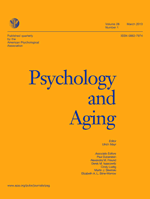
PSYCHOLOGY AND AGING
Scope & Guideline
Transforming insights into aging through psychological research.
Introduction
Aims and Scopes
- Cognitive Aging:
Research on cognitive changes that occur with aging, including memory, attention, and executive function. The journal emphasizes the factors influencing cognitive decline and maintenance across the lifespan. - Emotional and Social Well-Being:
Studies examining emotional regulation, social relationships, and their impact on mental health and life satisfaction in older adults. This area often explores the interplay between aging and emotional responses. - Health and Aging:
Exploration of the psychological aspects of health in older adults, including the effects of chronic illness, caregiving, and health behaviors on cognitive and emotional well-being. - Lifespan Development Psychology:
A focus on how psychological traits and processes develop and change over the lifespan, including the impact of life events and transitions on aging. - Methodological Innovations:
The journal encourages innovative research methodologies, including longitudinal studies, experimental designs, and computational modeling, to enhance the robustness of findings in aging research.
Trending and Emerging
- Impact of COVID-19 on Aging:
There is a growing body of research examining how the COVID-19 pandemic has influenced psychological well-being, social connectivity, and cognitive functioning in older adults, reflecting the immediate societal impact on this demographic. - Resilience and Adaptation:
An increased focus on resilience mechanisms among older adults, including how they adapt to stressors and challenges, indicating a shift towards understanding positive aging and coping strategies. - Technology Use and Aging:
Emerging studies explore the role of technology, including social media and telehealth, in enhancing social engagement and cognitive functioning among older adults, addressing the digital divide. - Subjective Age and Perceptions of Aging:
Research increasingly centers on how subjective age and personal perceptions of aging influence health outcomes and psychological well-being, shedding light on the psychological aspects of aging. - Multidimensional Well-Being:
A trend towards examining well-being from multiple dimensions—cognitive, emotional, social, and physical—reflects a holistic approach to understanding aging and its complexities.
Declining or Waning
- Age-Specific Interventions:
While earlier publications often explored targeted interventions for older adults, recent trends show a shift towards broader psychological processes rather than specific intervention strategies. - Comparative Age Studies:
There has been a noticeable decrease in studies directly comparing age groups, with a growing focus on within-group analyses and the unique psychological processes of older adults. - Neuropsychological Assessments:
Research that primarily emphasizes neuropsychological testing as a standalone focus has declined, as the field increasingly integrates cognitive assessments with broader psychosocial factors. - Traditional Theoretical Frameworks:
The reliance on classical theories of aging, such as disengagement theory, has diminished in favor of more integrative and nuanced approaches that consider the dynamic interplay of various factors influencing aging.
Similar Journals

EXPERIMENTAL AGING RESEARCH
Unveiling the Secrets of LongevityEXPERIMENTAL AGING RESEARCH, published by Taylor & Francis Inc., is a leading journal that has been at the forefront of aging research since its inception in 1975. With an ISSN of 0361-073X and an E-ISSN of 1096-4657, this journal has earned a notable reputation, including a Q3 ranking in the field of Aging and impressive Q1 and Q2 rankings in Arts and Humanities and Geriatrics and Gerontology respectively. This positions the journal within the top percentile of its category, highlighting its significant impact and contribution to the scientific community. Covering a broad scope that intersects various disciplines, EXPERIMENTAL AGING RESEARCH aims to disseminate pioneering research, foster interdisciplinary collaboration, and provide a platform for innovative studies that enhance understanding of the aging process. While it currently does not offer Open Access, researchers and academics can access its rich repository of knowledge that spans multiple facets of aging, from physiological changes to psychological impacts. As the field of aging continues to evolve, this journal remains an essential resource for researchers, professionals, and students dedicated to advancing knowledge and practices concerning aging and longevity.

REJUVENATION RESEARCH
Unlocking the Secrets of Lifelong VitalityRejuvenation Research is a premier journal dedicated to the advancing field of gerontology and aging research, published by Mary Ann Liebert, Inc. Established in 2000, the journal serves as a pivotal platform for the dissemination of scholarly articles that explore the complex mechanisms of aging and innovative approaches to rejuvenation. With an impact factor reflective of its robust scholarly contributions, the journal currently holds a Q4 ranking in Aging and a Q3 ranking in Geriatrics and Gerontology, showcasing its relevance in the academic community. This periodic publication, welcoming open access submissions, invites researchers, professionals, and students alike to engage with cutting-edge findings that could shape future geriatric practices and enhance quality of life. The journal underscores the importance of interdisciplinary collaboration, encouraging explorations that intersect with biochemistry, genetics, and other vital areas of study. Through its ongoing commitment to high-quality research, Rejuvenation Research remains a critical resource for understanding the biological underpinnings of aging and the strategies to mitigate its effects.

Aging Medicine
Pioneering Research in Gerontology and GeriatricsAging Medicine, published by Wiley, is a pivotal open-access journal that has been at the forefront of research dedicated to the aging population since its inception in 2018. With a focus on both geriatric care and gerontology, the journal serves as a crucial resource for researchers, healthcare professionals, and students interested in understanding the complexities of aging and the related medical challenges. Although it holds a Q3 quartile ranking in the fields of Aging and Geriatrics and Gerontology according to the 2023 metrics, the journal continues to effectively disseminate valuable research and insights, helping to bridge gaps in knowledge and practice. With an E-ISSN of 2475-0360, it offers an open-access model that ensures broader accessibility to its published content, thus promoting collaboration and innovation across disciplines. As the journal converges towards 2024, it remains committed to evolving with the dynamics of aging research, making it a significant platform for the exchange of ideas and advancements in this essential field.

Journal of Gerontological Nursing
Connecting Research and Practice in GerontologyThe Journal of Gerontological Nursing, published by SLACK INC, is a leading peer-reviewed journal dedicated to advancing the field of gerontological nursing through innovative research, clinical practice, and educational advancements. Since its inception in 1975, this journal has become a crucial resource for researchers, healthcare professionals, and students interested in the care and management of older adults. With an impact factor that reflects its significance within the disciplines of gerontology and nursing (Category Quartiles: Q3 in Gerontology and Q3 in Nursing), it serves as a platform for disseminating vital findings, best practices, and evidence-based approaches aimed at improving the quality of life for the aging population. While the journal maintains a print-only format, its content is invaluable for those looking to stay ahead in the rapidly evolving landscape of gerontological care. As it continues to publish until 2024, the Journal of Gerontological Nursing invites contributions that foster dialogue and innovation within this essential area of healthcare.
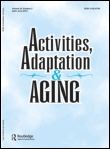
Activities Adaptation & Aging
Advancing knowledge at the intersection of aging and health.Activities Adaptation & Aging is a leading journal dedicated to the intersection of aging research, health professions, and gerontology, published by Routledge Journals, Taylor & Francis Ltd. With its origins dating back to 1981, this journal has established itself as a vital resource for scholars and practitioners alike, focusing on innovative approaches to enhance the quality of life for older adults. The journal’s inclusion in various prestigious Scopus ranks—such as being positioned in the 92nd percentile for Health Professions (miscellaneous)—reflects its significant impact in the field. Operating without open access, it provides essential insights and empirical research that are crucial for advancing knowledge and practices related to adaptation and engagement in aging. With a strong reputation built over the decades, Activities Adaptation & Aging continues to be an essential platform for disseminating research findings, fostering scholarly dialogue, and promoting effective interventions for aging populations.

Ageing International
Unveiling Insights into the Aging ExperienceAgeing International, published by SPRINGER, is a distinguished journal that has been at the forefront of scholarly research in the field of gerontology and aging studies since its inception in 1974. With an ISSN of 0163-5158 and an E-ISSN of 1936-606X, this journal provides a platform for high-quality, peer-reviewed articles that address the multifaceted aspects of aging on both individual and societal levels. Recognized as a Q2 category journal in Health (social science) for 2023, Ageing International plays a critical role in disseminating knowledge that influences practice, policy, and future research directions in the ever-evolving landscape of aging. Researchers, professionals, and students will find this journal indispensable for staying current with cutting-edge analyses and discussions, as it holds a Scopus rank of #168 in the social sciences realm, placing it within the 54th percentile of its category. Although it does not offer an open-access model, its extensive archive and ongoing contributions to the literature make it essential reading for anyone engaged in understanding the challenges and opportunities of aging in society. The editorial office is located at ONE NEW YORK PLAZA, SUITE 4600, NEW YORK, NY 10004, UNITED STATES, further emphasizing its dedicated presence in the academic community.
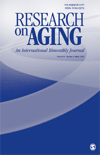
RESEARCH ON AGING
Bridging research and practice in the field of gerontology.RESEARCH ON AGING is a renowned academic journal dedicated to advancing the knowledge and understanding of aging and its multifaceted effects on health, society, and psychology. Published by SAGE PUBLICATIONS INC, this journal has been a pivotal resource since its inception in 1979, disseminating cutting-edge research and insights that shape the field of gerontology. With a commendable impact factor and esteemed rankings in Geriatrics and Gerontology (Q2), Health (social science) (Q1), and Social Psychology (Q2), it positions itself at the forefront of ongoing dialogues in these critical areas. The journal appeals to a diverse audience, including researchers, healthcare professionals, and students, who seek to explore the complexities of aging. Though access is not available through Open Access, RESEARCH ON AGING continues to be an essential platform for impactful research and multidisciplinary discussion, making it an invaluable asset for anyone interested in the social and health-related dimensions of aging through to 2024 and beyond.
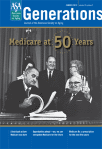
Generations
Fostering Discourse on the Future of AgingGenerations, published by the American Society on Aging, serves as a vital interdisciplinary platform for scholars and practitioners within the field of aging and gerontology. With its ISSN of 0738-7806 and E-ISSN of 2694-5126, this journal has been a valuable resource since its inception in 1985, connecting research and practice across converging years and advancing discussions surrounding the complexities of aging and lifespan studies. Although classified in the Q4 quartile for categories such as Geriatrics and Gerontology, Life-span and Life-course Studies, and Public Health, its contributions are increasingly relevant in a rapidly aging society. The journal’s emphasis on critical issues surrounding aging makes it essential reading for health professionals, policy makers, and researchers dedicated to enhancing the quality of life for older adults. As it continues its publication journey up to 2024, Generations remains committed to fostering scholarly discourse and offering innovative insights in this crucial area of study.
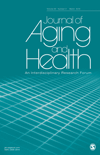
JOURNAL OF AGING AND HEALTH
Elevating discourse on aging and societal health.The JOURNAL OF AGING AND HEALTH, published by SAGE PUBLICATIONS INC, is a preeminent peer-reviewed journal dedicated to advancing research in the field of gerontology and related disciplines. With an impressive impact factor and ranked Q1 across multiple categories including Community and Home Care, Geriatrics and Gerontology, and Health (Social Science), this journal has established itself as a vital resource for academics, clinicians, and policymakers alike. Spanning over three decades of publication from 1989 to 2024, it serves as a platform for innovative research and multifaceted discussions on aging, health, and the interplay of social factors influencing the elderly population. The journal's rigorous standards for publication ensure high-quality contributions that are impactful and relevant, making it an essential read for those dedicated to improving the health and quality of life for older adults. Although it is not an open-access journal, it provides comprehensive insights that are critical to understanding the complexities of aging in today's society.

Geriatrie et Psychologie Neuropsychiatrie du Vieillissement
Transforming Perspectives on Aging and Psychological Well-beingGeriatrie et Psychologie Neuropsychiatrie du Vieillissement is a pivotal academic journal dedicated to the multidisciplinary study of aging, encompassing the fields of geriatrics, neuropsychiatry, and psychological health in the elderly population. Published by JOHN LIBBEY EUROTEXT LTD, this journal fosters knowledge dissemination and innovation, contributing to the understanding of the complexities faced by aging individuals. With a broad scope that includes biological psychiatry and neuropsychology, it serves as a vital resource for researchers, healthcare professionals, and students engaged in geriatric medicine and mental health. Although currently classified in the Q4 category across various relevant medical and psychological disciplines, the journal addresses critical topics that are essential for enhancing quality of care and improving patient outcomes. Additionally, the journal is accessible via open access options, promoting wide-ranging readership and collaboration within the academic community. As the field continuously evolves, Geriatrie et Psychologie Neuropsychiatrie du Vieillissement remains commited to pushing the boundaries of research and practice in gerontology and neuropsychiatry.